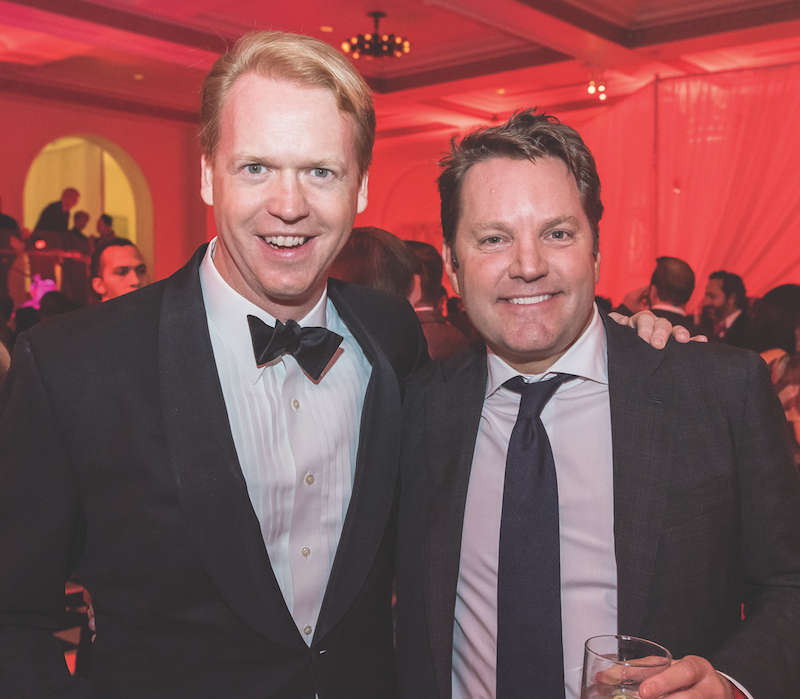OREGON BALLET THEATRE CHAIRMAN OF THE BOARD OF TRUSTEES

Jimmy Crumpacker, Oregon Ballet Theatre’s Chairman of the Board of Trustees, and Rob Goodman at the Alice (in Wonder) Ball and The Red (Queen’s) Party in 2018 at the Portland Art Museum. Photo credit: James D. Colhoff Jr.
Why are the arts important to you?
It is a privilege to participate in the arts, and it gives me great pleasure to contribute my time and resources to OBT. Whenever I watch a performance, I sense the small role I play in making the production a reality. I get immense satisfaction watching thousands of schoolchildren, whose feet can’t touch the ground, sitting inside the Keller watching one of OBT’s outreach performances. OBT reaches over 26,000 people in Oregon through the outreach program at little to no cost to them. This is essential: There might be the next great dancer, or artistic director, or set designer in the audience who is inspired by something OBT does. Without the arts, there would be an enormous void in our great state of Oregon. The arts enrich every phase of life, open us to see the world in new ways, and connect us to our humanity and one another.
Why do you believe philanthropists should direct their efforts to the arts?
The arts are the ultimate expression of a society reaching for greatness and providing hope. As of the Renaissance, humankind could sustain itself and so turned its attention to focus on a multitude of art forms. We are now at a tipping point with so many different types of entertainment vying for our limited attention and resources. With government agencies and corporations withdrawing financial support from the arts, it is critical now, more than ever, for individuals and foundations to fund programs. The entertainment space is brutally competitive. Without generous donors, local arts organizations cannot possibly compete with media and technology corporations willing to spend billions of dollars to convince audiences to stay at home and watch TV. To make the art form as accessible to Portland audiences as possible, OBT charges a fraction of the actual cost of a ticket to break even on every production.
How should classic arts organizations make a case for relevance to those raised in a digital age?
The shared experience of sitting in an auditorium full of an appreciative audience can never be duplicated at home. And Oregon Ballet Theatre can never and should never have to compete with Netflix or Instagram. The best approach is to keep the art form accessible, which we do by selling tickets to most shows for under the price of the roundtrip Uber ride to the Keller. The medium of dance is best when seen live, in person. It is a shared experience with other audience members that only lasts for a fleeting moment in real life but lives on in our memories. You cannot pause an OBT performance like your television or phone and come back to the event. Being present is paramount. We are coming to a point in our society where people recognize just how addicting phone or television use can be and how damaging that is to our young people. Unfortunately, tech companies realize how the brain responds to certain activities on our phones and programs their platforms to take advantage of us. I am not saying put down your phone all day, but many parents, teachers, and leaders in our city recognize the importance of unplugging for a few hours. OBT provides an outlet to explore your brain, be transported to a different place, and watch and wonder in amazement at some of the best athletes and artists our city has to offer.
What are your thoughts about how families could cultivate legacies of giving?
My good fortune was to have parents who cared deeply about the arts. My mother, Anne Crumpacker, started working in the art world in her 20s and is now an artist working with bamboo as her primary medium. She is an inspiration! Years after I graduated from college, she went back to school and received a master’s in fine arts. In the summer between her first and second year of art school, she lived with me in New York City while interning at the Metropolitan Museum of Art. Usually, the MET is the most crowded museum in the world, but at the time, it was closed on Mondays. As an employee, she was permitted to invite me to experience the MET when it was empty. I would go after work, and we would explore some of the best art and spaces in the world without anyone around. We visited the impressionists’ paintings and had uninterrupted conversations from one wing to the next. My parents always took my sister and I to theater, dance, opera, symphony, museums, and more when we were children. It is harder to focus as a child for long periods, but my parents were very patient. Not until after I graduated college did I appreciate the education my parents gave me, not only as a child but also as a young adult. It is hard to foster legacies of giving unless you expose children to the arts. As an adult, I love experiencing and being involved with the arts. If you had told me when I moved back to Portland a few years ago that I would be chair of the board of Oregon Ballet Theatre, I would have said you had gone down the rabbit hole to chase Alice. But after spending the last five years on the board, I appreciate the incredible passion of the OBT dancers and artists.
I hope by spreading this spectacular art form and exposing as many people in Oregon to OBT, it will inspire other families to give and believe in the power of the arts.
